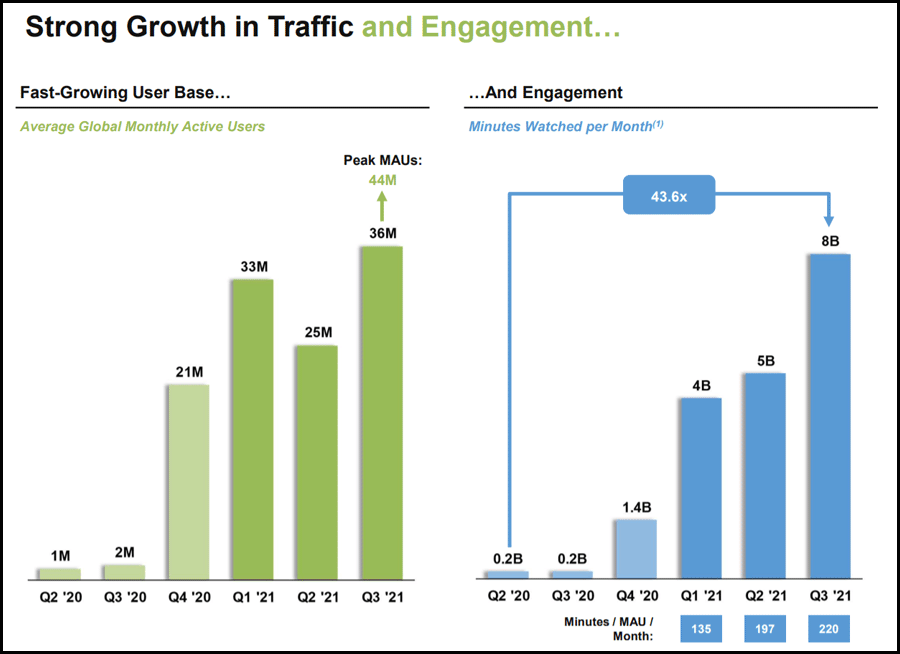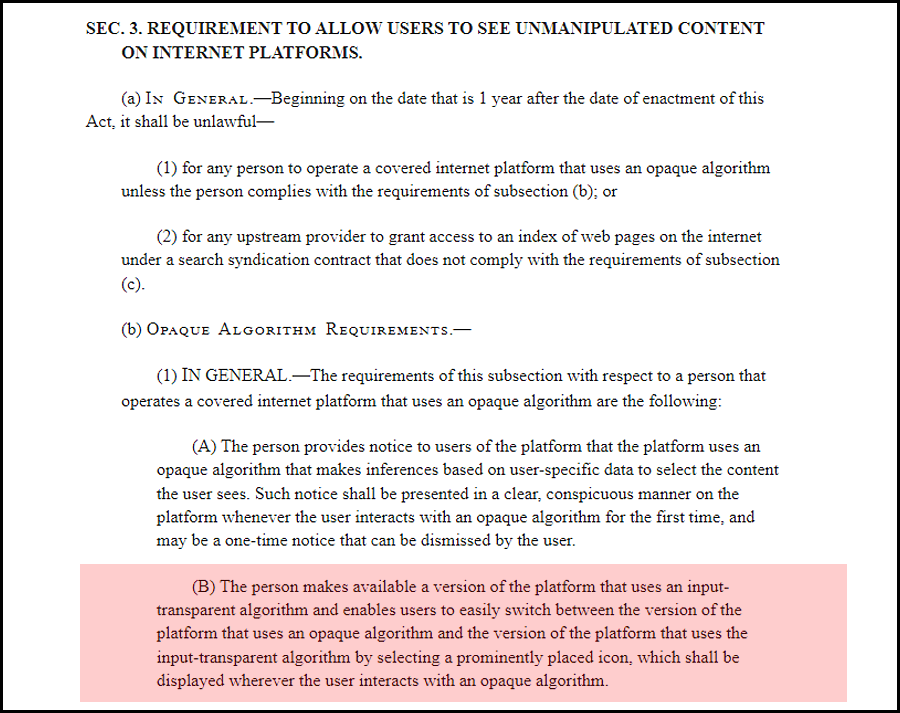Op-Ed: Big Tech’s Continued Censorship Leading To Slew Of Alternatives, Direct Competitors Growth; New Legislation Could Further Help

WEST PALM BEACH, FL – If you told someone that Google, the massive number-one search engine company which also happens to own the number-two search engine in the world, YouTube.com, that it was making and breaking businesses, I don’t think anyone would be one bit surprised.
Google makes and break businesses creating winners and losers each day, and thus has pretty-much been the status quo for at least a decade now. But what might surprise you is that Google – and others – are contributing to their own competitors growth when it comes to competition for search, social media and video sharing.
For example, Google’s continued censorship has given rise to its own competitors such as one of the most popular alternatives for search, the DuckDuckGo.com search engine, which has experienced considerable growth over the last decade, originally due to privacy concerns as DuckDuckGo dubs itself to be the search engine that “doesn’t track you” with all sorts of advertiser cookies, but while privacy was initially its main lure, searchers are increasingly looking for search engines free of censorship which has also contributed to alternative search engine growth.
While its initial buzz has begun to fade slightly with users having noticed that even DuckDuckGo.com has “become compromised” and may be censoring its results users are seeking out even more alternatives such as Qwant.com and Startpage.com. Nonetheless, the more Google censors, the more market-share it creates for others; albeit, a tiny slice, but something worth striving for when it comes to smaller players fighting for market share.
Google still dominates the market with 91.94% of the search market, according to StatCounter.com, an exceptional website statistics program and Google Analytics alternative.
DuckDuckGo.com, which fought Google for the rights to the domain “Duck.com”, which the search giant was pretty much holding hostage until 2018, is a search engine that grew out of users desire for a serious alternative to Google, and the more Google became a target for privacy concerns, the more interest in alternative search engines grew. To this day, the more Google censors its results, the more users look for alternatives.
Google’s New Video Competitor
No alternative has seen as much growth, in my opinion, then the Toronto-based video platform “Rumble.com”, the alternative video sharing site and now direct competitor to YouTube.com. Rumble’s monthly user count experienced rapid growth since July 2020, from 1.6 million monthly users to a whopping 31.9 million by the end of the first quarter of 2021. Could this have been related to the growing censorship of conservative media leading up to the 2020 election? Assuming it played a role to some extent seems a fair assumption.

A current lawsuit against Google filed by Rumble claims Google initially tried to censor Rumble out of its search results to stunt its growth or favor its own site, YouTube.com; the search giant will now have to answer for this alleged anti-competitive behavior. Google has filed a motion to dismiss portions of the suit, however, the case remains pending.
Unfortunately for Google, the more censorship that takes place on the YouTube.com platform, the more users move over to competitor Rumble. It’s likely getting noticeable to the company and Google’s YouTube will need to cut-back on its censorship as those efforts are clearly becoming its own self-inflicted wound.
Thanks to Google and other platform censorship, Rumble is now a rising star in the online video content realm and has become the preferred platform for users seeking alternatives to “Big Tech” platforms such as YouTube.com with new users, including politicians like Florida Gov. Ron DeSantis, Republican Rep Devin Nunes moving over to Rumble. Senator Rand Paul recently promoted the fact that he would be completely dropping YouTube in favor of Rumble.
“I’ve decided I’m going to quit giving them [YouTube] my content. I’m going to give my content to somebody who has a similar viewpoint to mine on speech, not necessarily politics,” Paul said in an interview with Spectrum News 1.
Senator Rand Paul (R-KY)
Other prominent voices such as Dan Bongino, Steven Crowder, and the New York Post have also turned to the Rumble platform due to online censorship. The more censorship, the more users shift. Rumble is also expected to go public and provide video and streaming services for Trump’s much anticipated social media network. Chris Pavlovski, the founder and CEO of Rumble, said the company is “excited to provide technology and cloud services to TMTG.”
“We continue to build the infrastructure to deliver a free, open, and neutral internet. Rumble was designed to be immune to cancel culture, and we are at the forefront of a movement that believes everyone benefits from access to a neutral platform that hosts diverse ideas and opinions.”
Chris Pavlovski, the founder and CEO of Rumble
The New York Post experienced one of the worst examples of online censorship in history when in 2020 its article on Hunter Biden’s now infamous lost laptop was literally erased from the internet less than three weeks before the presidential election. Online platforms deleted the material from its source, eliminated the ability to privately direct message it, and removed any links of any sort which would lead users to the content saying the news story violated its policies due to questions on how the New York Post had obtained the material in the story – unheard of.
Big Tech social media platforms Facebook and Twitter are also leading to the growth of their own alternatives such as Andrew Torba’s Gab.com, Jason Miller’s Gettr.com and John Matze and Rebekah Mercer’s Parler.com. They too will need to consider the extent of censorship they will implement to prevent user abandonment and the growth and popularity of these rising stars.
The Filter Bubble Transparency Act
The internet initially grew exponentially when people found they could go online and find just anything they wanted, whenever they wanted, but things are changing now. Searching is getting harder to do, while information being presented, in most cases, is being “filtered” to at least some degree. It continues to get more difficult to differentiate what’s news, what’s advertising, what’s influenced, and what’s true. Even the fact-checkers require fact checking.
Imagine being able to go back to the old internet and see an unfiltered view of information? That’s where the Filter Bubble Transparency act can help.
This new regulation proposed would create a necessity for search engines to show you their massive trove of data, images, video and information – unfiltered. Search engine companies like Google would have to allow you to perform a search and have access to an ‘unfiltered view of results,’ sort of like the beginning of the Internet before Google was manipulated by so much money and politics.
Big tech platforms like Facebook would be ‘required’ to allow you a view at what would have appeared in your feed, if they had not removed it due to the necessity to include ads, or for more nefarious reasons such as to “protect” you from ‘harmful misinformation’ they deemed would “not be in your best interest” to view. They would be forced to show you all of the information, even if it were “Missing Context,” God forbid.
You would be the gatekeeper of your own information intake, once again. These search giants and big tech companies would have to rely on you to deem what’s in your best interest and allow you to make up your own mind on the information you seek, without intervention on their part. Some might go as far as to say, it’s brilliant.

This legislation is in the interest of every single American internet user who seeks ‘unbiased’ results in the information they seek. An unmanipulated view of what to read, what to watch, and when to watch it. It offers a fundamental change to the internet as we now know it. It’s actually for once a piece of legislation for the greater good of society, protecting your online experience, and offering a new way to learn what is really going on with your neighbors or those across the globe, and to prepare yourself for the days ahead. In a war of information, its one of the most critical pieces of legislation pending, and its getting little notice, because Big Tech fears it.





Comments are closed.